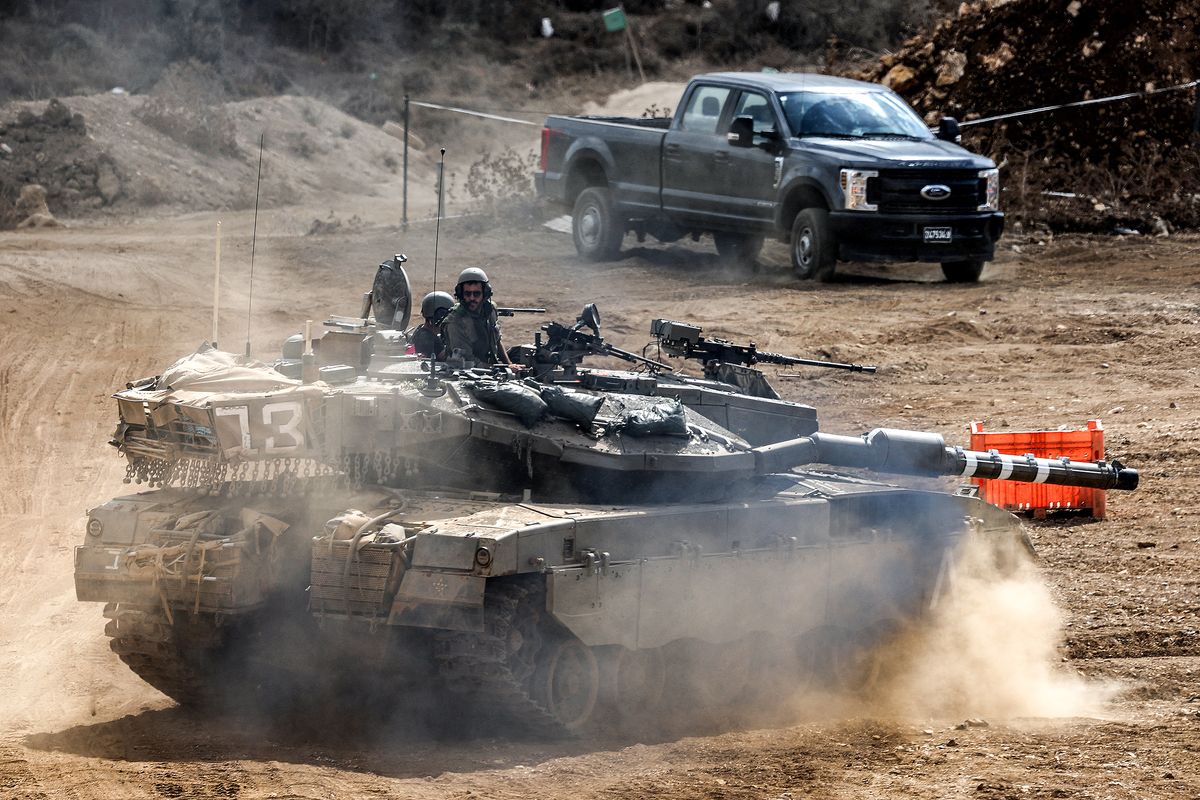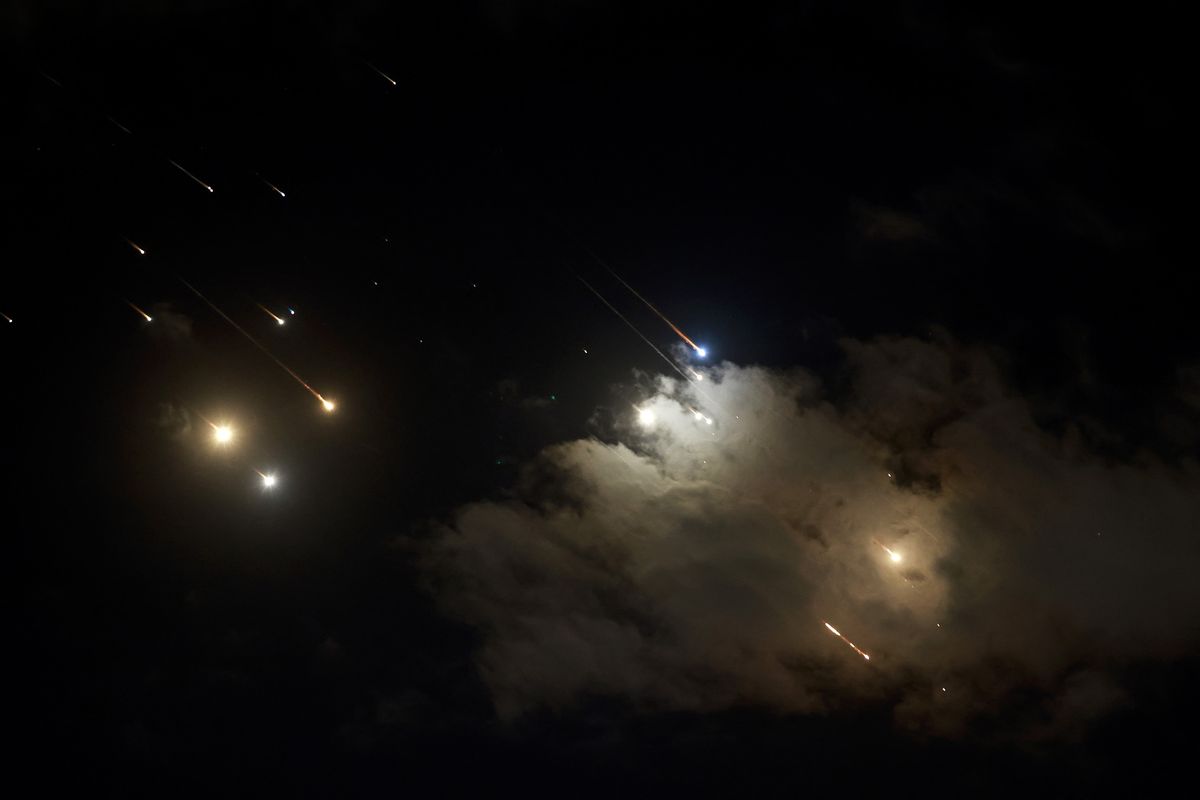Iran launches missiles at Israel amid ground invasion of Lebanon
An Israeli army main battle tank moves at a position along the border with Lebanon on Monday in northern Israel. The Israeli army on Monday said it launched a ground offensive in Lebanon and that its forces engaged in clashes, further escalating the conflict after a week of intense air strikes that killed hundreds. (Ahmad Gharabli/AFP/GETTY IMAGES NORTH AMERICA/TNS)
BEIRUT – Iran fired nearly 200 ballistic missiles at Israel on Tuesday in retaliation for attacks on the Tehran-backed Lebanese militant group Hezbollah, just hours after Israel invaded Lebanon with ground troops for the first time in nearly two decades.
The sharp escalation brought Israel and Iran closer to direct conflict more than at any time in recent history.
While Lebanese civilians fled their homes to escape Israeli incursions early Tuesday, Israelis hunkered down in bomb shelters across the nation as air raid sirens signaled the Iranian missile barrage.
Israeli officials vowed to retaliate for the Iranian attack. Israel’s U.S.-financed air defense system intercepted many missiles, lighting up the night skies with bursting rockets.
In Washington, U.S. Secretary of State Antony J. Blinken said Israel, with U.S. assistance, “effectively defeated’’ the Iranian attack. Initial reports, he said, indicated no casualties or significant damage. One Palestinian man was reported killed in the West Bank city of Jericho, possibly by falling debris from an intercepted rocket.
U.S. officials said they are urging Israel to limit its operations in southern Lebanon, although their ability to influence Israel has waned dramatically.
The Iranian attack “will have consequences,” Israeli army spokesman Rear Adm. Daniel Hagari said. “We have plans, and we will act.”
Shortly after the missiles were launched, Iran’s Islamic Revolutionary Guard Corps said in a statement that it was retaliating for the killing of Palestinian Hamas leader Ismail Haniyeh, Hezbollah General Secretary Hassan Nasrallah and senior Iranian military official Abbas Nilfroushan. Iranian President Masoud Pezeshkian warned: “This is only part of our power – do not enter into a conflict with Iran.”
In Tel Aviv, where many of Iran’s missiles appeared to have been aimed, Israelis spent a couple of hours in shelters when the attack started.
As loud booms reverberated outside, residents in one shelter sat in a circle of chairs and some bean bags left over from a previous war. A father sat on one chair, calmly reading a bedtime story to two young children sitting on his lap. In one corner a mother swayed, cradling a newborn.
Iran’s strike was only the second time it has directly attacked Israel, preferring usually to fight its archenemy through proxies such as Hezbollah. But the damage Israel has inflicted on Hezbollah, including the assassination last week of Nasrallah, became more than Iran could allow to go unanswered, officials said.
The previous Iranian attack on Israel was in April, when the Islamic Republic launched a barrage of some 300 rockets and drones in response to Israel’s killing of a senior Iranian commander in Syria. Israel’s allies had advance notice of that attack, and, led by the U.S., scrambled a coalition that included Arab states and succeeded in intercepting nearly all the projectiles. Damage was minimal.
President Joe Biden and Vice President Kamala Harris were sequestered in the White House situation room to monitor events, their offices said Tuesday, and to plan any U.S. reaction. Already, the Pentagon said it was dispatching “several thousand” additional U.S. troops to the region, including fighter jet and attack aircraft squadrons.
U.S. officials expressed relief that losses Tuesday were not excessive but acknowledged the showdown was not over.
“We will consult with the Israelis about the next steps in terms of the response and how to deal with what Iran has just done,” White House national security adviser Jake Sullivan said.
“There must be consequences for Iran,” State Department spokesman Matthew Miller said.
The fast-moving developments came as Israel moved ground forces backed by tanks into southern Lebanon, vowing a “limited” operation, but raising the specter of another occupation.
It reported scattered firefights around the southern Lebanese villages it was raiding. Israel continued to pound parts of Beirut and other sites with airstrikes that in recent days have killed dozens of people, including Nasrallah.
Israel, through an Arabic-language spokesman using the social platform X, ordered the evacuation of nearly two dozen towns and villages in southern Lebanon, telling the residents to move northward about 40 miles from the border.
Lebanese fled advancing Israeli troops, crowding into vehicles and taking to highways with a handful of possessions.
Some of the areas listed for evacuation were near Tyre, southern Lebanon’s most populous city, including Rashidiyeh, where Bassam Abdo and his son, Khaled, lived.
Khaled stood atop their Citroen van, lashing down overstuffed suitcases with rope. “I’ve left so much stuff behind, but I just took what I needed,” he said, adding that they were heading to Tripoli, Lebanon’s northernmost city.
“I need to get out of here,” his father said. “I’m getting a heart attack from the panic.”
Hezbollah spokesman Mohammed Afif said that Israeli troops had not penetrated the border, but that Hezbollah fighters were prepared. He said Hezbollah fired medium-range missiles toward central Israel earlier Tuesday.
Israel said the ground offensive began with a covert border crossing overnight under the cover of heavy air and artillery strikes.
Three brigade combat teams that had been fighting together in the Gaza Strip moved to occupy areas in southern Lebanon that had been heavily damaged by recent Israeli airstrikes.
The army “is conducting limited and targeted raids along Israel’s northern border against the threat that Hezbollah poses to civilians in northern Israel,” Hagari, the military spokesman, said in a statement. “These localized ground raids will target Hezbollah strongholds that threaten Israeli towns, kibbutzim and communities along our border.”
The Biden administration – largely sidelined by Israel as it expanded the conflict with Lebanon in recent days – said it supported Israel’s ground offensive and had received assurances from Prime Minister Benjamin Netanyahu’s government that the operation would be limited.
Those assurances from Netanyahu have often proved hollow, U.S. officials acknowledged.
Israel’s massive assault on the Gaza Strip was aimed at wiping out the militant organization Hamas, which attacked southern Israel on Oct. 7, killing 1,200 Israelis.
It has stretched into a year. More than 41,000 Palestinians have been killed there, according to Gaza health officials, which does not distinguish between civilian and combatant deaths.
This is not the first time Israel and Lebanon have clashed. In 1982, Israel invaded Lebanon in what it described as a mission to root out Palestinian guerrillas.
At one point Israeli troops marched on Beirut before eventually pulling back to a 400-square-mile “buffer zone” to, then as now, prevent attacks from Lebanon into northern Israel.
Israel withdrew – nearly two decades later. They fought again in 2006 in a monthlong war.

